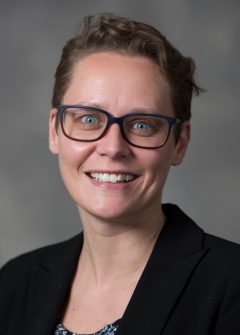A report by the International Refugee Assistance Project with contributions by Katherine Reynolds, who oversees Elon Law’s Humanitarian Immigration Law Clinic, recommends improvements to the process by which refugees separated by war and conflict can be reunited with loved ones.

An Elon Law educator with a decade of experience advocating for immigrants and asylum seekers has contributed to a national report that calls on the Biden Administration to improve the process for reuniting refugees whose scheduled family reunifications were delayed or permanently halted under President Trump.
Assistant Professor Katherine Reynolds, director of Elon Law’s Humanitarian Immigration Law Clinic, joined with colleagues from the International Refugee Committee, Community Refugee & Immigration Services, and Church World Service to author “Families in Limbo: What the Biden Administration Can Do Now to Address Unreasonable Delays in Refugee and Asylee Family Reunification.”
Published in March under the direction of the International Refugee Assistance Project, the report recommends the White House immediately move to:
- Roll back Trump-era administrative actions
- Improve the vetting process for reunifying families
- Reduce inefficiencies in domestic processing
- Bring uniformity to overseas processing
- Expand the use of humanitarian parole and requests to expedite delayed cases
The report concludes that delays in the legal process by which refugees can have certain immediate family members emigrate to the United States has led to thousands of separated families and that “tragically, some spouses and children stranded abroad have been harmed or even killed while awaiting a decision from the government.”
IRAP provides legal advocacy for refugees and displaced people, helping clients to identify and navigate pathways to safety through free direct legal representation, systemic advocacy, and litigation.
Since 2016, Elon Law’s Humanitarian Immigration Law Clinic has provided legal representation for 76 refugees/asylees applying for 154 beneficiaries. Of those, only five petitioners have been reunited with five relatives to date, including two petitioners who still have at least one more family member waiting overseas. Today, 65 refugees/asylees await their reunification with nearly 140 spouses or children.
Before joining the Elon Law faculty, Reynolds was the Immigration Legal Services Program Coordinator at a refugee resettlement agency in Greensboro where she assisted refugees with adjustment of status and helped more than 150 lawful permanent residents to naturalize through a USCIS Citizenship and Integration Grant.
She was a supervising attorney at a refugee legal aid agency in Cairo, Egypt for three years, serving as director in her final year and managing an international staff of interpreters, attorneys, and volunteer legal advocates who provided assistance in obtaining UNHCR protection, refugee status, and resettlement for refugees and asylum-seekers from Sudan, Somalia, Ethiopia, Eritrea, Iraq, and Syria.


